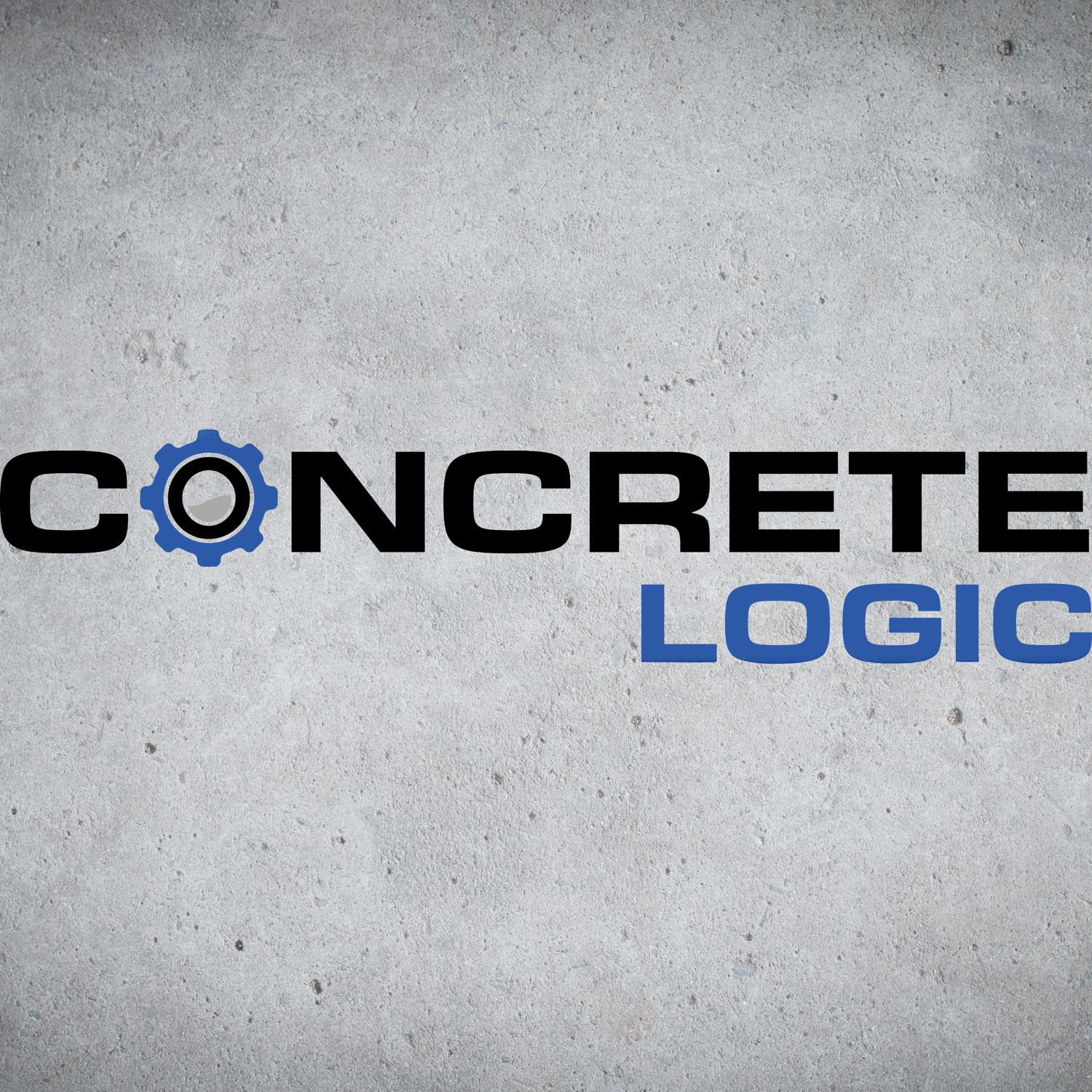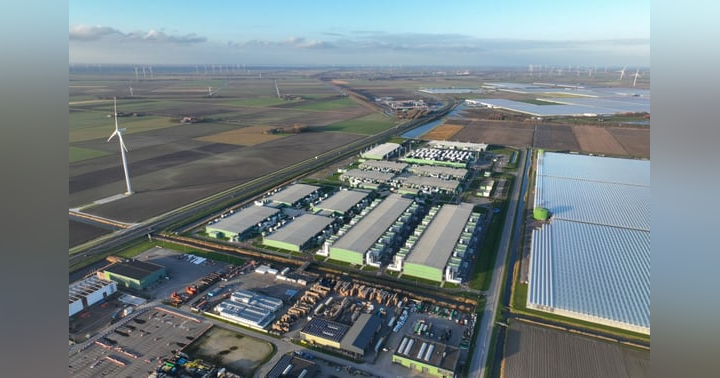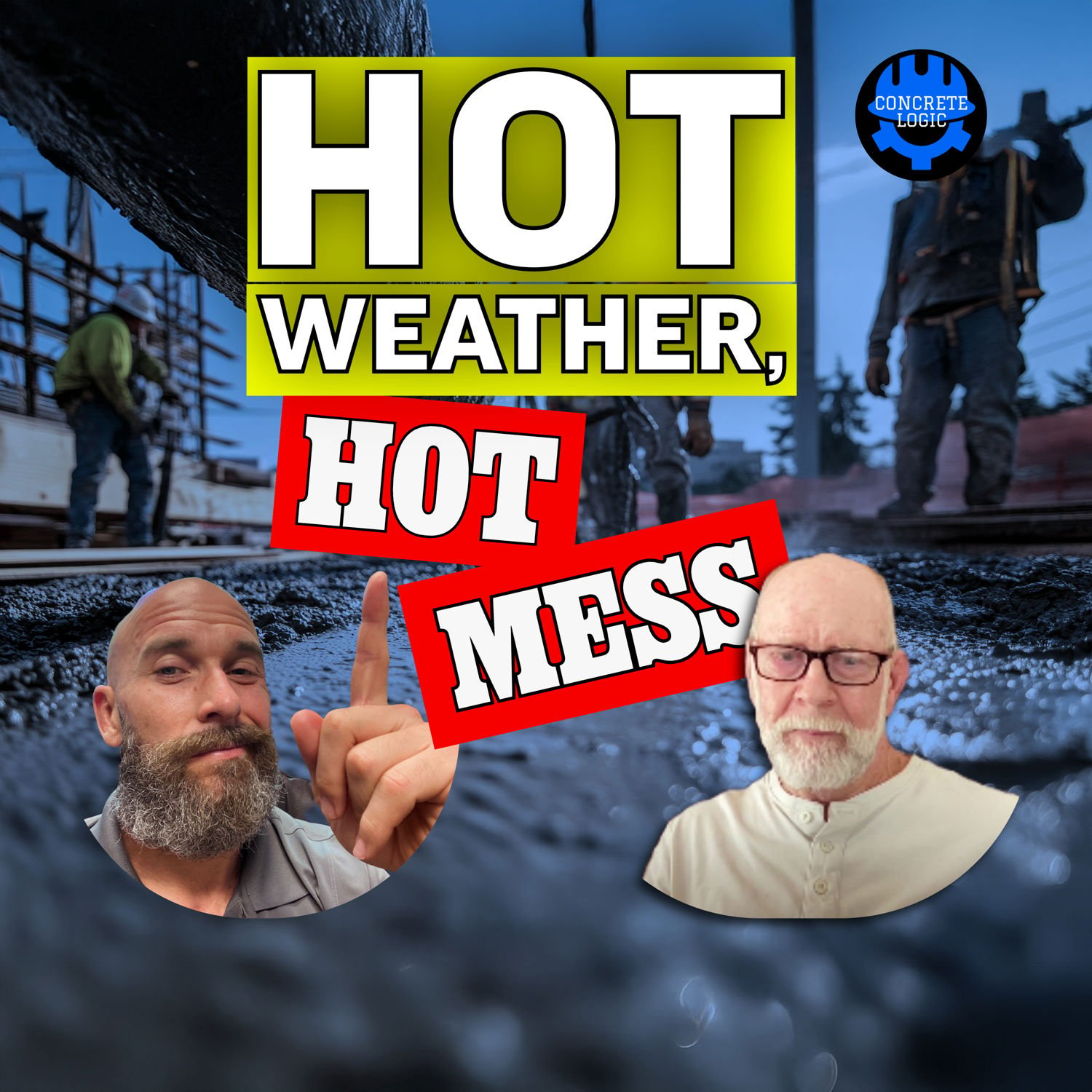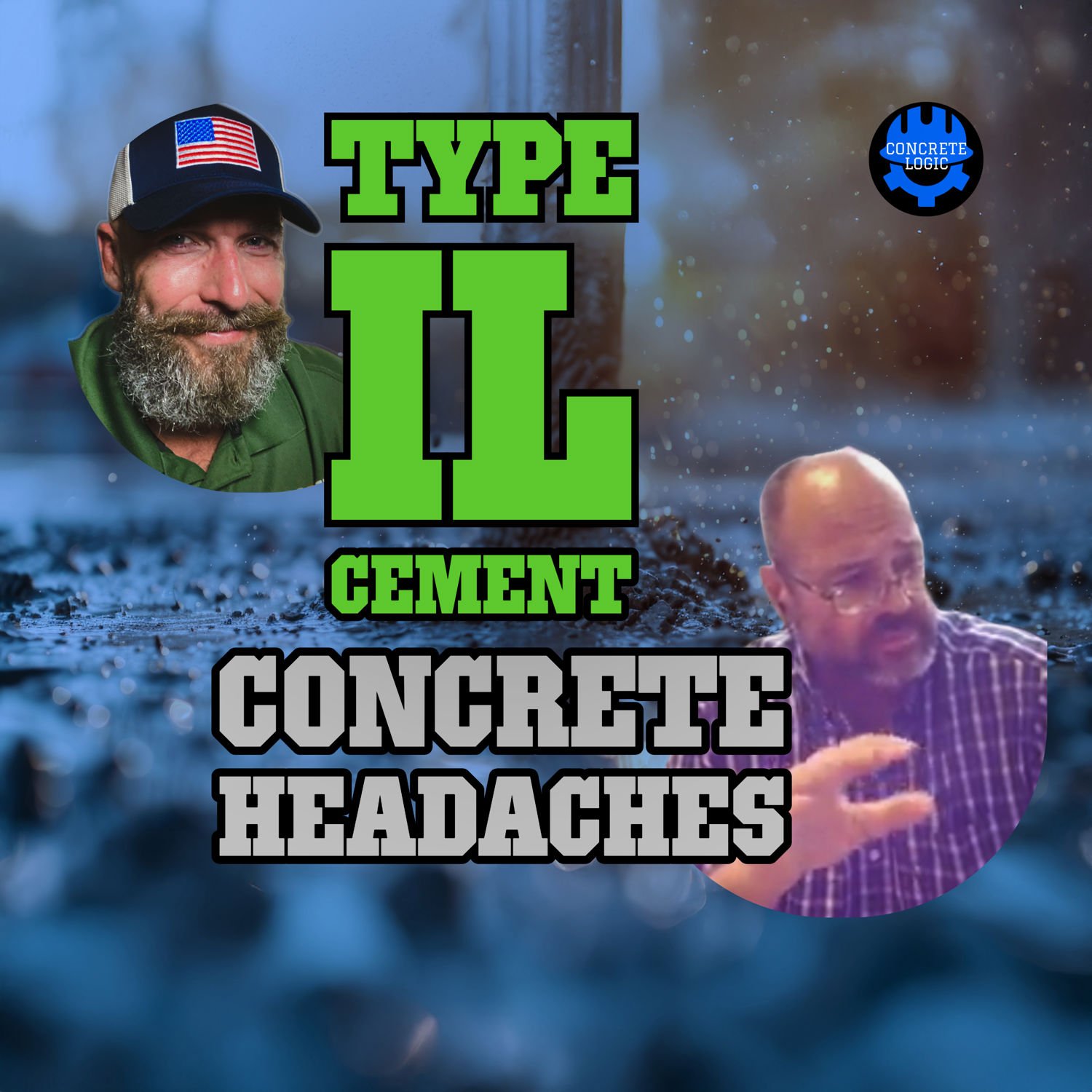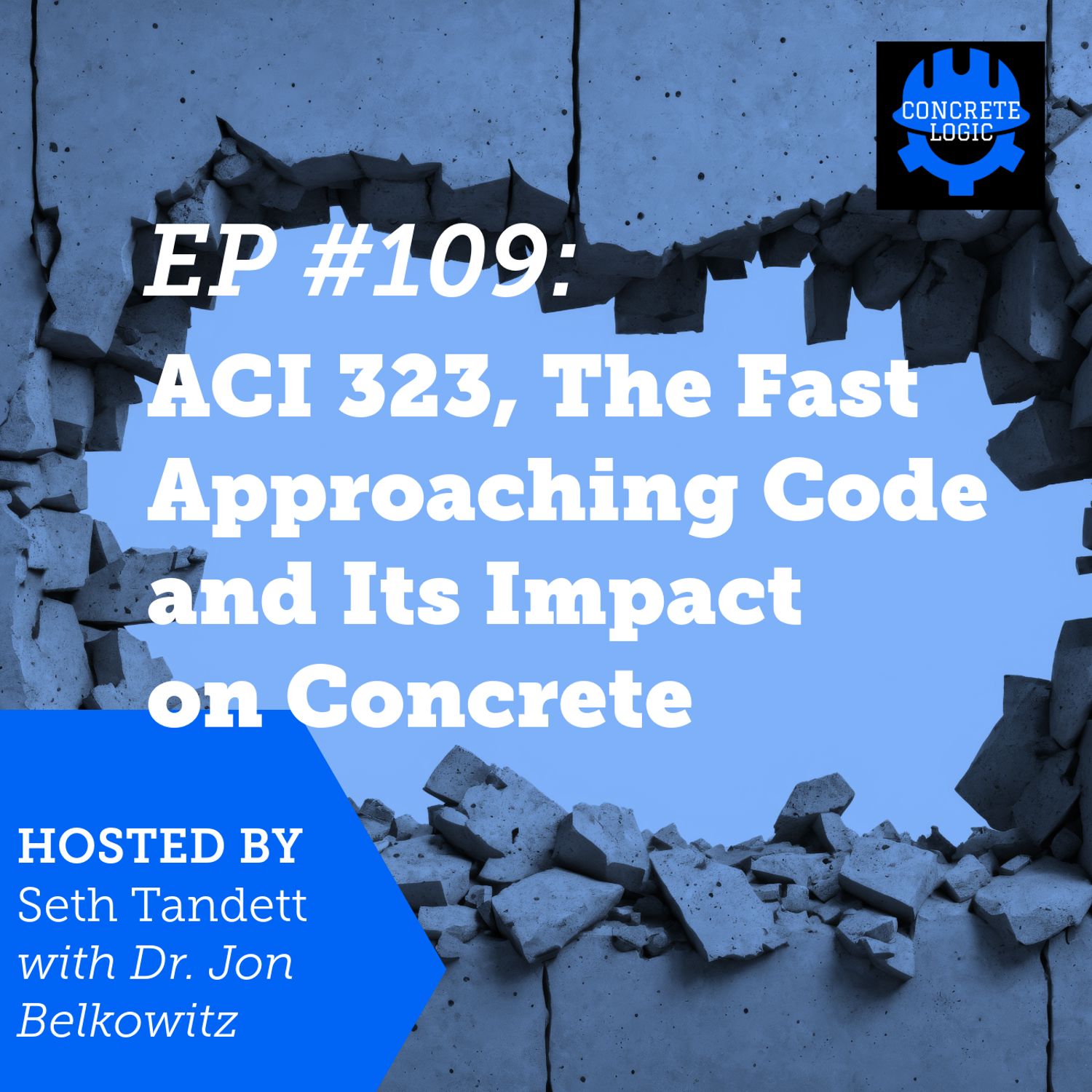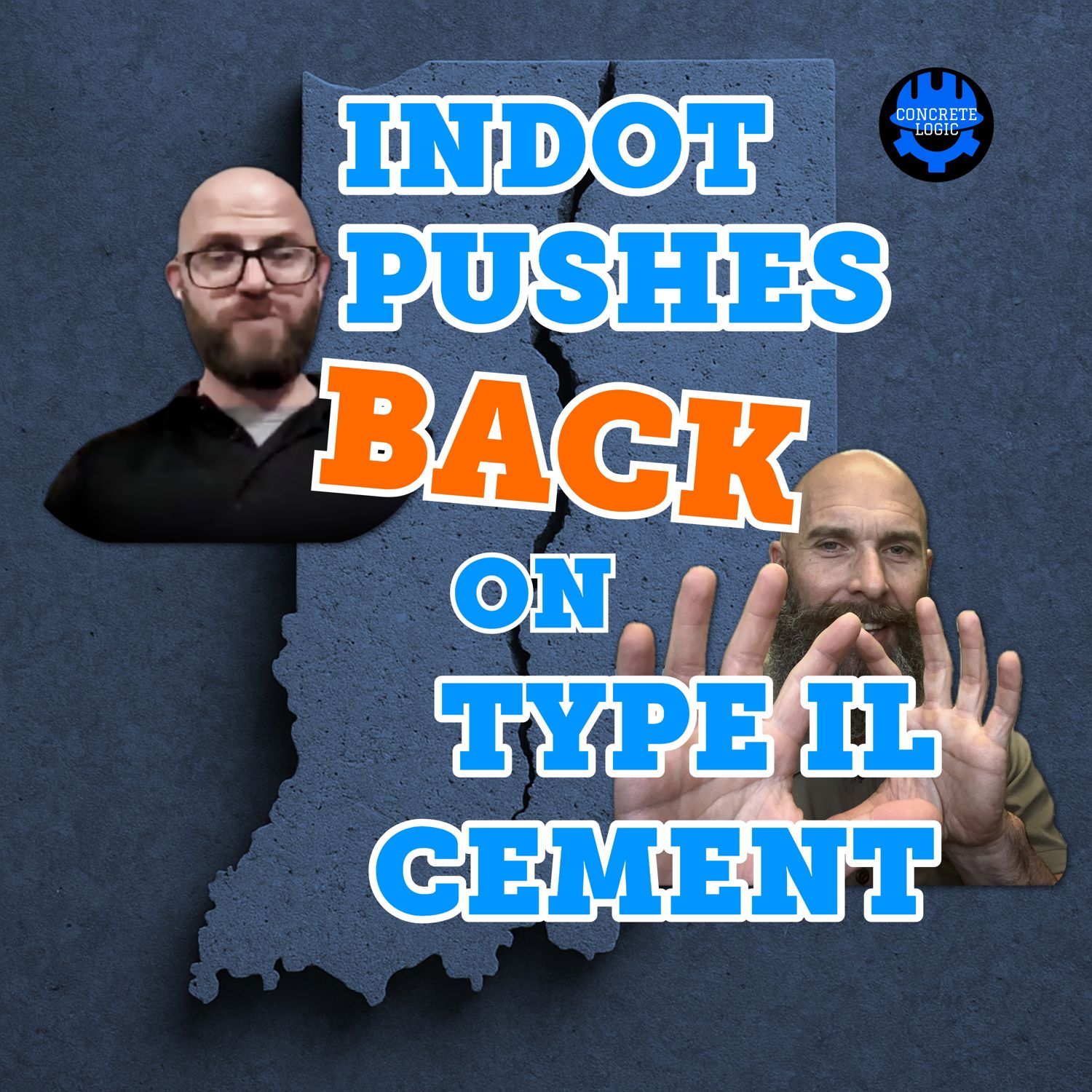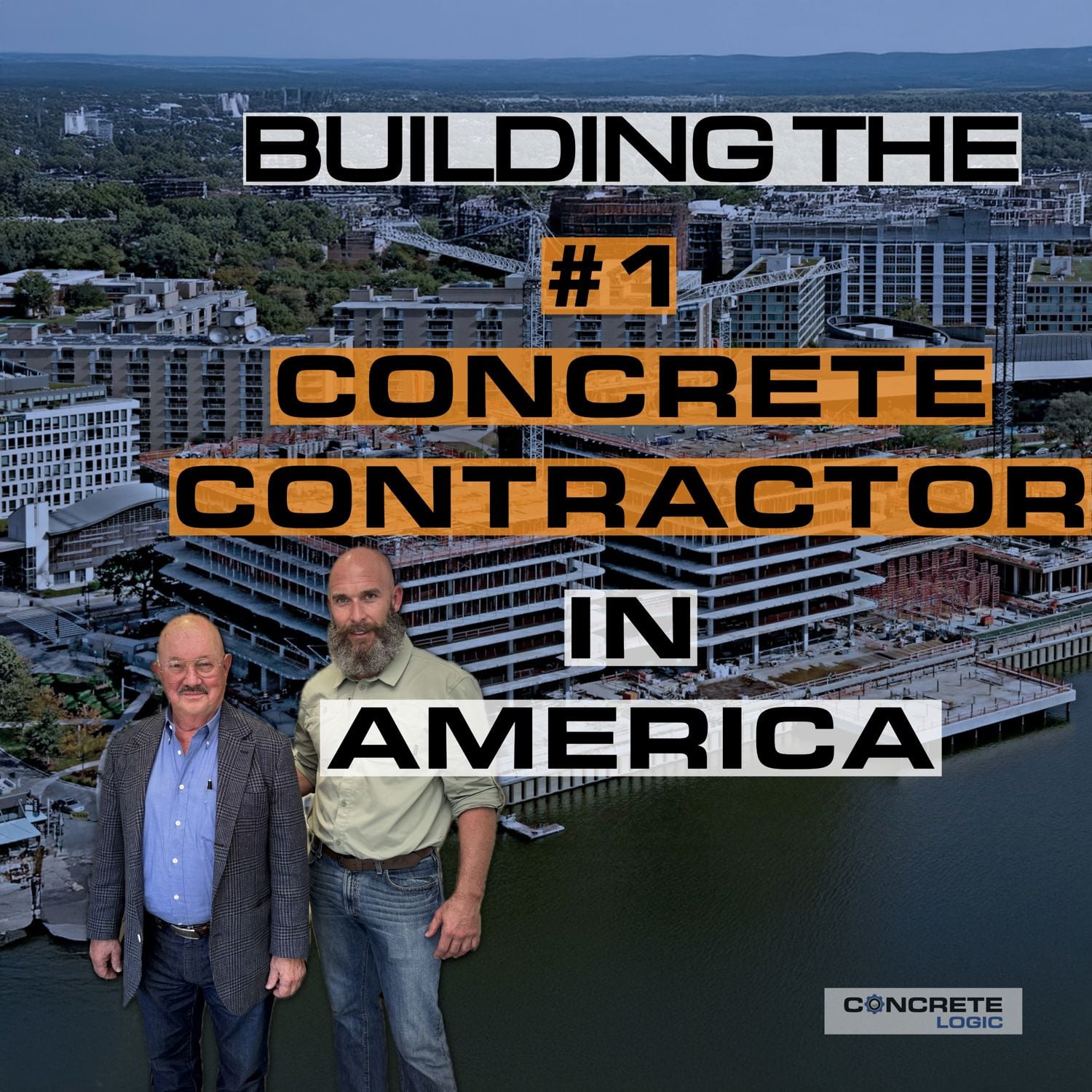EP #135: Concrete Job Market - 2025 Reality
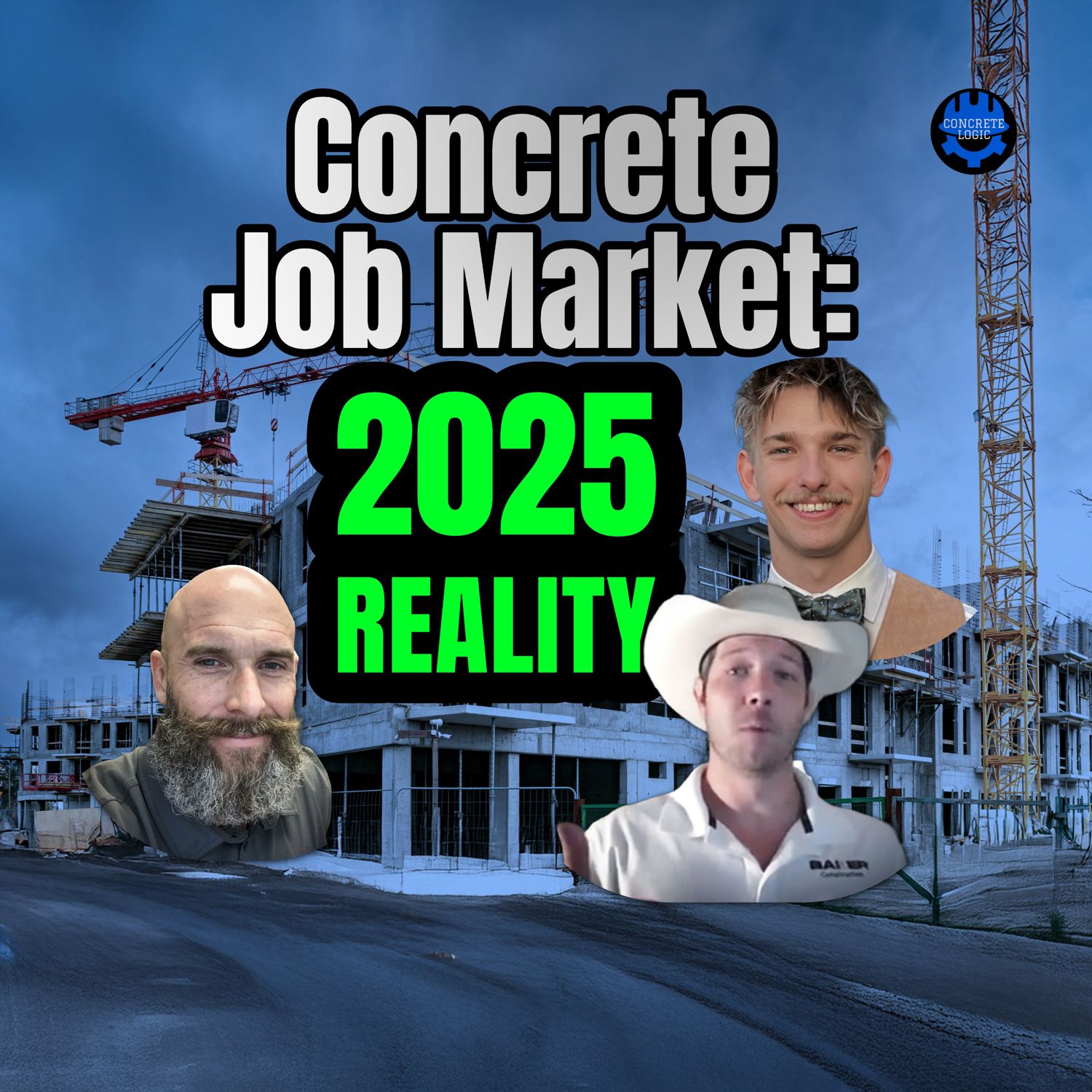
Have we’ve moved from the “Great Resignation” to the “Great Staying Put” era?
In this episode of the Concrete Logic Podcast, Seth Tandett sits down with Patrick Narron and Parker Jackson to talk about what’s really going on in the construction job market. They cover shifting job-seeker mindsets, geographic mobility, and how to spot real opportunities when the market demands more for the same paycheck. From recruiter strategies to personal career sacrifices, this conversation helps job seekers and companies get clear on today’s landscape.
What You'll Learn
• Why are workers staying longer instead of chasing new jobs?
• Is relocating still worth it in today’s construction market?
• What red flags should candidates look for when evaluating opportunities?
• How can recruiters use advanced communication to stand out?
• What do market cycles reveal about job security and loyalty in construction?
Chapters
• 00:00 – Introduction to the Current Job Market
• 01:32 – Shifts in Job Seekers' Mindsets
• 05:26 – Personal Experiences in Career Moves
• 07:19 – Market Trends and Job Tenure
• 09:12 – Cyclical Nature of the Construction Industry
• 16:26 – Evaluating Job Opportunities and Red Flags
• 21:27 – The Importance of Advanced Communication
• 25:42 – Regional Market Insights and Trends
Guest Info
Patrick Narron
Email: narronp@bakerconstruction.com
LinkedIn: https://www.linkedin.com/in/patrickpnarron/
Company: Baker Construction – www.bakerconstruction.com
Parker Jackson
Email: jacksonp@bakerconstruction.com
LinkedIn: https://www.linkedin.com/in/parker-jackson-tamu/
Company: Baker Construction – www.bakerconstruction.com
Concrete Logic Academy
Earn PDHs the easy way. Listen to podcast episodes, complete a short quiz, and get professional development hours with proper documentation.
Start your free trial: https://www.concretelogicpodcast.com/academy
Support the Podcast
This show runs on a Value-for-Value model. If you got value from this episode, consider supporting us:
https://www.concretelogicpodcast.com/donate
Support the show while gearing up with KUIU premium outdoor gear—what Seth wears both on the hunt and on the job. Shop through this link at no extra cost: https://www.concretelogicpodcast.com/KUIU
Want help with media services like podcasting or YouTube for your concrete company? Reach out to Seth at seth@concretelogicpodcast.com.
Credits
Producers: Jodi Tandett and Concrete Logic Media
Music by Mike Dunton: https://www.mdunton.com/
Connectivity
Host: Seth Tandett – Concrete Visionary & Business Development Manager at Baker Construction
LinkedIn: https://www.linkedin.com/in/sethtandett
YouTube: https://www.youtube.com/@concretelogicpodcast
Website: https://www.concretelogicpodcast.com
Don’t forget to like, subscribe, comment, and share. Let’s keep it concrete.
Seth Tandett (00:00)
And welcome to another episode of the Concrete Logic Podcast. And today, Patrick Naren, talent specialist, acquisition specialist for Baker. Construction, I'd still like to say Baker Concrete. We do concrete. And then Parker Jackson, he's regional recruiter. Is that correct, Parker? I get it. Yeah.
Parker Jackson (00:23)
Absolutely. Mid-Atlantic.
Seth Tandett (00:25)
And I, yeah, keeping everybody's titles, straight these days is, getting tough. but anyways, these fellas wanted to come on the episode today. We're seeing, or they're seeing a dynamic, in the, recruiting out there that we haven't seen in a while. And what we're seeing, what they're seeing is our, there are, folks that are staying at put,
where they're working versus what we've been seeing the last, I would say the last four to five years. There was a lot of job jumping, but also there's people they're seeing out there that are willing to look at opportunities that may require them to move to a whole different area or state or something like that, that they're having more conversations about that.
These guys are going to clue us in on what's going on. We're recording this just for reference in September of 2025. So if you're listening this in the future, you know, so you know what era we're talking about. with that, Patrick, I'll let you get started with the topic of the day.
Patrick (01:32)
Thanks Seth. Appreciate the introduction and good morning to everybody. Good afternoon whenever you're listening into this podcast. Good evening as well. What Parker and I have been seeing in the marketplace recruiting recently drew an uptick in our awareness to people's mentality so much so that kind of even wanted to bring it to the forefront of the nation. Having been an executive search now coming up on a decade very soon, never before have we seen the mindset shift being so polar.
on two different ends of the scale at the same concurrent time. Backtracking, what we typically see when we have conversations is people who are open to hearing about opportunities to move their career forward. Maybe they're ready, usually not quite ready to make an instantaneous decision, but open the field and you build a relationship and you track them months, years, you just stay in touch. What we're seeing now is we're dropping into conversations with people where instead of having that middle ground
of building the relationship and staying in touch. They're going one of two directions almost instantly when we're presenting the idea of what we're doing very clearly. They're hopping back into the boat of this is where I wanna stay, this is the company I wanna be at, I wanna hunker down. Then we're also seeing people who before the prospect of the location, geographic location, the financial compensation, what the market's presenting where historically they would not...
really take the conversation or filter it out or hear about it. They're now both listening proactively
seeing if that's the right fit for their families.
United States, know, in the desert area, are looking at opportunities in the mid-Atlantic Northeast, where geographically they would have maybe stayed more on the Pacific side of the country. And it's happening in mass. you know, Parker and I, we talk about these things every single day. What's the market looking like? What's our mentality? What we have found has been, you know, maybe we're driving the force of this, of the Polar Ship, is the clarity in the conversation about what the market is right now, our opportunity specifically being at Baker.
and really be able to scale that out to what the concrete industry looks like and be able to present to people a truthful and real transparent one year, two year and five year projection for what we believe the market to be like. And again, back in the day, we would share the stuff. I think people really heard it, conceptualized it, but would follow into the train of thought when they were ready. Now, they're either they're ready or they're not. There's an instability and an insecure.
but also a real security that are popping up. And again, it sounds super critical to have like we're going full one way and a full the other way, but there's not really much of a middle ground anymore. For example, when we're speaking with somebody and again, we'll say in a desert region.
You know, the things that are important to people out there, the cultural values, typically keep them in the geographic region. know, Bible Belt to the Bible Belt, you have your high academics in the Northeast, you have those who love the sun and the coast on the Pacific, and you can really stay in those regions. Now, California, Arizona, West Texas, East Texas, like places like Houston, Parker's gonna speak to this here in a second, being one himself. Before, if you had
required a higher tax income state, pulling them out of that geographical region. The conversation was almost like, I'm not going to field that. What we're finding, Seth, is people are now like, tell me more about what that opportunity looks like.
Parker Jackson (04:46)
you
Patrick (04:52)
I can develop as a person in that region where maybe my political beliefs are different in the region that I'm going to
However, I see the opportunity for long-term growth personally that supersedes what the environment I may be going into. We're seeing a lot of people either show a lot of grit or really want to hunker down where they're at right now. So Parker, I'm going to pass it to him real quickly because he's a prime example of this. Texas A graduate was living in Houston when I first began speaking with him. Statistically, Seth, he would never really
Parker Jackson (05:24)
Thank you.
Patrick (05:26)
Over the last seven years, I've never relocated someone from Texas further north that wasn't for family. know, maybe Florida, maybe somewhere in that Southeast region. However, know, Parker being a prime example, and there's others that we have who are speaking to, are very much moving to Virginia now, let's say, or looking at that Northeast quadrant. So, you know, speaking from experience and why I wanted to bring Parker on today was have him kind of speak about what he felt and what he's seeing, being actually one of those people in the market who's making these geographies.
Parker Jackson (05:55)
Yeah, absolutely. To me, it's all about keeping up with the market, right? At the end of the day, you got to do what's going to further your individual career. That for me, it was making a move. At the end of the day, you know, I do have all my family down in Texas. That's where I went to school. That's where I love. That's where maybe long term I'll circle back to, right? But, you know, especially within construction, you have to really follow the work.
is what it comes down to and making that move is only worth it if it's gonna be pivotal to what you're doing in the foreseeable future. And that's what Patrick was talking about earlier is you either get people staying immediately local or making a big move. It's kind of two polar opposites, different ends of the spectrum there but.
To me, it took making that move to a completely different region because it gave me the training, it gave me the opportunity to advance my personal career where if I stayed put, I certainly would be closer to family, but it's real tough to be competitive in the market today if you're not willing to make some sort of sacrifice.
Patrick mentioned grit, sacrifice is another word for it. At the end of the day, if you want to further your own career, you have to be willing to at least hear out those opportunities. Can be hard to do, but worth it in the end, I think.
Seth Tandett (07:15)
No, just I wanted to give a little bit of a.
Patrick (07:16)
And things are very cyclical too.
Seth Tandett (07:19)
Yeah, I wanted to give a little market background, Patrick, about, I mean, there's some recent news. The big thing was this month, the BLS job revision, where they revised the number over 900,000 jobs, fewer jobs were created between April 2024 and March 2025. So...
they were tracking before that revision that there were about 147,000 jobs were added every month in that period of time. With that revision, it's now, it's less than half that, 71,000. So with that revision, I don't know if folks are paying that much attention to that, but that's...
You know, that's a different story than what we've been told the last couple of years. Um, so I think also what's going to be interesting too is the, I found that the job tenure, you know, how long people been staying at jobs? Uh, the average has been, uh, like back in 2022, it was a little over four years. Uh, and that number.
last year came down as well. And that was just for, like I mentioned before we got started, all the job jumping that was going on since COVID. So it actually got less than four years, about 3.9 years was the overall length of time people are staying at a job. So it'll be interesting to see this change that you two are seeing out there.
If we revisit this in a couple years, what that average time with your employer is going to be.
Patrick (09:12)
100%. And to this, you know, was gonna say this before, but you just added perfectly to it, Seth, the cyclical nature of the market too. know, nothing stays the same in construction. You know, we're always adapting and it's easy to see trends, especially when you track data over a long period of time. And one of the blessings we have being at Baker's that, you know, we are a 68 year old company, maybe 69, somewhere in that range. And the data we've been tracking goes back decades. A huge portion of what we're coming into now,
If you look at the data, we just came out of the hottest multifamily run of all time. Data centers are the premier go-to now for construction to keep things afloat. But when you track back even further than 10, but like looking at 15 years ago when we're looking back at the like the 08 market, who pushed through, how did they push through? Like even as a Baker, the stories that I know that came out of 08, 09, or 10 were pretty incredible what we did to stay afloat. The people that I know who were working with Baker
of project engineers, project managers who are now vice president, operations manager, people who sent the C-suite for us. What they were required to do during that time is a lot what we are looking at now where the model for the last 10 years has been work from home, stay from home, and we still have that model here at Baker. However, if you are ambitious and like to really push your career forward and take those steps higher up, faster, let's say PM, senior PM to a project executive, the willingness
be back on the road traveling. I would say it's becoming a more popular trend. And I would say with traveling specifically here for Baker's, plug for us, we do have traveling.
to Florida, you know? Like if it's traveling, like, hey, you know, you're based in Virginia, maybe you go down to...
geographic. However, the way we're expanding and the opportunities for those to be stable, have clarity in their career for one year, two year, five year, even be able to target a 10 year plan for them, the adaptability in order to go
you were talking about before, the number of the job creation has lowered. Well, the jobs that are being created are more valued and as Parker mentioned,
one to be successful at it. That has changed since before when most people just went to a market it could stay there and I think that's where the polarization of the marketplace and it actively is right now. What part
that is not to actually recruit people. And I teach them this every single day, and this is our mindset. Our job is to allow the candidates and the people we're speaking with to clearly explain who they are, what
achieve their five-year goals. We then explain to them who we are, what we're doing, and we plan to be in five years and see if there's an alignment
It says it's trying to reconnect. Did you catch that, Seth? Did I come in right there? Okay. said it's unstable internet, so I wasn't quite sure if it was picking me up.
Seth Tandett (11:59)
Yeah, you came, you... Yeah, you... We gotcha.
It's okay. Parker, did you want to add to that?
Parker Jackson (12:07)
I truthfully missed a little bit of that, cut out a little bit there Patrick, at least for me. you know, it circles back to be willing, the part that I heard, to follow that location, you know, to be aggressive in making that change for your career. Because if you're in the middle of a market where there's just no work, how can you expect to progress?
So making a move sometimes is again worth it, difficult, but worth it in the end.
Seth Tandett (12:35)
Yeah. Um, I'll just add, I'm, I'm a little bit older than you guys. Um, so I started, I started, uh, back in, uh, 2001 and, uh, the, uh, environment, uh, that, you know, they had the.com, uh, crash in 2000 and the, the, um, the hiring environment was nothing, uh, close to what it's been the last, you know, again, the last four or five years.
where if you could fog up a mirror, you got a job. There was few and far between opportunities out there. And like these guys are getting at, it's very similar to the environment that I'm not saying we're in the thick of that right now, but starting to kind of sound like that, that you're going to have to separate yourself from the...
the rest of the folks out there looking for a job and one of those ways is going to be taking those opportunities that may not be very convenient for you. So, but what I would say the positive of that is if you can do these sacrifices now, those sacrifices go a long way for your career. If they look at your career and you stayed put around wherever you grew up,
whole time and I'm not saying anything's wrong with that. And they compare you to somebody that's actually moved, know, had to move across the country to take an opportunity and grow in their career. I'm going to, you know, that other person that had to make that sacrifice will probably have a leg up on you because they know this person's willing to take
you know, a chance and go out there and put themselves out there. Parker, you want to add to that?
Parker Jackson (14:23)
Yeah, yeah, absolutely. You know, from a personal perspective, that's what happened to me. You know, I was living in Houston, Texas. Baker's got an office down there.
It was on the table for me to just stay put but leadership design development for me personally Finding a market where I'd have long-term stability, you know growth for my career meant making a personal change To to where that the leadership was, you know at the end of the day, it's it's not always about the work It's not always about the immediate. Sometimes it is just the the one or two years down the road
where if I want to have a team underneath me, if I want to be in a place that's advantageous to lead others, then you gotta put yourself in a place where that can reasonably happen. Patrick likes to use the football analogies, if you're on the Patriots and you've got four quarterbacks deep in front of you and you're a rookie coming in and you've got Tom Brady starting, how can...
how can you expect to be on the starting roster within the next couple years? So instead, you know, maybe take a shot at joining the Browns, take a shot on yourself where you can, you can go that distance because you have the room to grow. So for me, it was certainly, you know, a tough decision. Family really mattered to me. Those, those Southern roots real, real important to me. But
At the same time, you know, it was it was a family move. I've got my girlfriend coming up with me and at the end of the day for me, it was a location where the both of us could could further our careers and and we wouldn't have to reassess within a year or two. At the end of the day, that matters quite a bit.
Seth Tandett (16:03)
Yeah. Patrick, could you maybe share some red flags that the job seekers should watch out for when evaluating a role? because we may be suggesting, hey, jump at that opportunity that may have you move across the country. Are there any red flags you would say to look out for?
Patrick (16:26)
Absolutely. First and foremost, always trust your gut. Always trust your gut. If your gut's telling you there's something that's right, you're probably right. So when you, with your gut feeling, ask tough questions to the prospective employer, not just about what they can hold you accountable, what you can hold them accountable for today, but tomorrow, when you're out, two years out, many times when we're recruiting,
Often there's a specific project that they will roll right into or they're going to be rolling to a group with some development, which is always great. People often seek that when they're making it to the next step in their career. But the question that your gut needs to be crystal clear on if you're willing to make a geographic big step is when you're asking
should be able to tell you what two years looks like. Two years, know, our projects run six months, 12 months, know, plus or minus maybe a little bit here and there. We should be able to share with you what two years looks like. Does that mean the exact project you'll be on? No. But in terms of human and personal development, hitting the marks and us tracking you, and again, I spoke about this on our last podcast with the idea
individual to help them achieve their goals.
What, whoo, got a little side track right there. Happens to all of us. In order to take the big step to where you want to go to, if you're willing to take a big geographic move, ask those two to five year questions, trust your gut, and really be honest with the employer.
think that's a na-
Baker through that IDP with our organized order chart and then the investment that we put into our leadership team to lead, train. as you know, we have sales and leadership academies that we send our executives to and having now been here almost two years at Baker, seeing our team in the mid-Atlantic specifically, their
retention rate with our executive leadership where year-to-date in 2025 Seth I'm really proud about this we haven't had anybody leave on the project management side or superintendent side due to a clarity in what's the next step in their career you know people have been offered more money people have decided they want to pivot out of construction but I was looking at
letters, not one project management channeled individual has left because they felt like they were capped in their career, which I thought was incredible because we have hired year-to-date over the last years for the Mid-Atlantic 100 leading keys.
96, we're getting there, rounding up by four, but 96 here today for being super specific.
Seth Tandett (18:52)
Wow.
Yeah. Yeah, that's a, that's a good stat. You got to bring that up in your review, Patrick.
Patrick (19:04)
Yeah, coming up in January. ha ha ha ha! Chuck and Richard if you're listening.
Seth Tandett (19:09)
Yeah, it's an interesting time. Like I said, I feel like we're going through one of those 01, 03 times and I would say...
I will share with you guys, I, what was this? I've been here 20 years now. I had a similar situation. So 05, 04? Yeah, 04. 2004, the company I was with asked me, I just started with them. Essentially I was with the company for about nine months and then they came to me and said, hey, you know, we...
We have a office that we're trying to get up and running in Richmond, Virginia. Would you, are you willing to go down there and help us get this office off the ground? And I was a much younger dude, didn't have a wife, didn't have kids. I jumped at the opportunity. From the time they told me or asked me, I say asked me, but told me.
From that time to the time that I had boots on the ground in Richmond was literally three weeks. So it's one of those times. I would say when you do things like that, the company really appreciates that, that you're willing to step up and do that. You just got to, like Patrick was getting at, you got to make sure that the company that you're looking at moving to or making a commitment with, even if you're staying in the...
Patrick (20:15)
Yeah.
Seth Tandett (20:40)
in the company you're with is asking you to commit and move somewhere else, you got to make sure they're a fit for you. Because we're talking about, you know, these are life changing, you know, decisions that you're making when you're moving from one part of the country to another. especially like Parker was sharing that, you know, he's got a significant other that he's bringing with him. So it's it's not just one person making the decision. It's it's a couple of people. So.
You guys, you know, just sharing what I've done in my career and hopefully this will, you know, someone's listening out there and they're like, huh, should I do this? You know, there's like, like you guys have been saying is you got to make sure it's right for you. Don't just do it to, cause you're here to on this podcast that that's what's going on.
Patrick (21:28)
We have the saying here for Baker recruiters, advanced sales is advanced communication. And advanced communication is being able to clearly explain more difficult ideas to individuals to help create them the ability to make a personal decision that they're confident in. Alex Baldwin, Glenn Gary, Ross, ABC, always be closing. The misconception is that closing is always people
or making a decision that gets the deal done. When closing in reality, is just allowing somebody to come in to their own point of decision. Just to make a decision. Give me a yes, give me a no. And what Parker and I really work with and where I think the polarization of the marketplace is, is that we are explaining very clearly what it is that we are doing at Baker. Now, six months, one year, two years, five years out.
that is giving the people the ability to be like, that sounds fantastic. And we have a low pressure environment. Like if you aren't looking to join what we're about, we're not trying to pull you to be a part of it. You know, we're doing something special and we want people who are willing to sacrifice and have grit. However, if so, if they're not in and what we're about is not connecting with them, we're seeing people who are very much, you know, I'll say this, people can utilize the Baker conversation to get a nickel or dime more on their paycheck. You know, that happens to us quite frequently.
Parker Jackson (22:34)
Yeah.
Patrick (22:48)
So we're seeing people not respond in this day and we've seen Parker can attest to this specifically. Tile promotions to stay at currently where they're at. I won't hit home too close home to Parker, but you know exactly what I'm talking about. But at the same time, if the company, if the clarity that we're describing to them, they don't have in their current location the aptitude to immediately begin the conversation requiring large, at large geographic steps.
is being pushed forward at a quicker rate than before, that would maybe take months, maybe years. We track people for years on end. Now it's happening in weeks. Now it's happening in a day. Now it's, let me talk to my wife tonight and I'll be back with you in touch tomorrow. In the past, tomorrow can be end of week, early next week, where it is that afternoon, text message, the family's in, let's begin the conversation. The speed is moving fast.
I do believe it's because of our ability to be clear, but also where people are like, I either need to be lock in and be strong for the next few years or be with someone who's going to help me get to where I want to be. But in a strong mindset where I don't feel like if I'm not reaching the highest height, I need to be looking over my shoulder, especially with our development programs at Baker. We are looking to help fill in the gaps where we can, you know, we're not trying to make your weaknesses strengths. We're trying to maximize on your strength. And then.
negate, like even out anything that maybe isn't your strongest suit. We have time, we have patience. mean, heck, I won't say names, but I know somebody who's worked in our organization many years ago who's still with us and one of our really top people who on one of their first projects cost us a million dollars. They're still with us. We groomed and developed them where they now have their own team with direct reports. We've not only coming to a company that can help push you forward, but has the ability to allow you to
make mistakes, that can be large growth moments, because I think all of us can attest we learn more through failure than we do through successes. Having an environment where you can professionally say the word fail or maybe not hit your highest marks, but people who care enough to help that next year to actually elevate you to that level or even further beyond, that's one of the things that makes us so special, is that people can come here and not feel like they have to be the perfect project manager. Come be the best version of yourself. We're actively looking to develop people, not
plug and play.
Parker Jackson (25:12)
.
Seth Tandett (25:12)
I know you're recruiting for the Mid-Atlantic. Are you seeing an area in the country where there's a lot of resumes popping up?
Parker Jackson (25:19)
Yeah, absolutely. To me, it's the states that don't have a particular market, you know, or where the market is slowing down. Patrick mentioned earlier that the multifamily boom is just kind of wrapping up and segueing into something different, you know, the data centers of the future. Whatever that hot market is tends to require a move. So, you know, people have been Florida.
South Carolina, Denver, Colorado, four multifamily builds. But as that specific line of work dries up, maybe you have to move just north to one of those empty markets to start data centers. So, you know, we're not always talking to move across the country. Likely you have work at most a state away that's booming. So for me, it just really comes down to weighing the options again for yourself. When candidates come to us.
Patrick and I are never trying to recruit someone to pull them into an opportunity where they don't want to be. If you're ever feeling like a recruiter is selling you on a role, it's not the right role for you. Instead, we're just showing you what's out there. And the conversations that we have with candidates the first 10 or 15 minutes is me just saying, Ted, hey, Seth, hey, Patrick, whoever you might be, what are you about?
What are you looking for in a long-term fit? And we don't always have it, is the truth of it. I've told guys plenty of times this week and last week, hey, I'd love to help you, but we don't have something that's gonna be a long-term fit. If you move and start on this project, you're gonna have to move your family twice within this next three-year period. So again, it's not a move that's...
we're convincing you of something, it should be a move that's bettering your career. And when we pitch that new market, when we pitch that new area, it's usually because we see something in the market, a trend for your specific future that can be worth your time is the goal. Hopefully we're never selling you into something that's the best fit for us but not the best fit for you.
Seth Tandett (27:22)
Yeah, well put.
Patrick (27:23)
And there
is one particular market, because Seth, as much as I want to share with you, I'm never quite sure who's viewing this. I'm hoping everybody's viewing this podcast. There is one geographic region that Parker and I are very much tracking. if people are into the marketplace right now and the way the boom has gone, they'll be very aware. It's in the southeast. But there's one market that we are having a lot of conversations in. Actively, the people aren't.
And this location could go to almost any one of our regions. To our knowledge, if that market doesn't pick up in six months, there's going to probably be a, not to say an exodus, but we could see a market shift where the talent in this market could probably drop anywhere from 25 to 40%. And 24 months, we're about six months out because of the active conversations with the superintendents, the estimators, the project managers out there. They're all beginning their next project.
with no backlog and according to what we're looking at the ABI actively, there's stuff in that state but nothing that's gonna keep them close to that home hub that has been a booming market for actually longer than seven years. It's a pretty major US Metroplex. just for the sake of, we don't wanna give away all of our industry secrets but there are markets that we pivot in that are more fruitful for certain times but that's staying in touch with where is the work coming, what's realistic.
Seth Tandett (28:41)
hehe
Patrick (28:48)
Is that market a per diem market that you can send people out of? In to Parker's point, there are major US cities that are booming with work that Baker's not in, but because of, talking about that two year, five year outlook. Speaking with Dan Baker, myself a few months ago here in Houston and asking him, why are we not in this particular market? And he walked me through, not every market's the best market for Baker to be in. What our principles, our ethos, our mentality is about doesn't fit what
maybe that local market stands for it. And that's okay. Certain people want to be, for example, the West Coast, California, our CEO Carl Watson, Seth, you've seen him talk about this. We're not in California, no plans are going to California. It's mostly a union market out there. Labor costs, labor codes, the retro seismic fit that you have to do on a West Coast high rise, we don't do in any of our markets. There's just some markets that aren't a good geographic
We'll tell the candidates, hey, we're not on the West Coast right now. Don't worry about the tensions to be. We'll keep you in the loop where if you guys are willing to relocate, we'd be happy to help. But if you wanna stay in California, Baker's not the best place for you to be.
Seth Tandett (29:53)
Yeah. Well, this was great, guys. I appreciate you coming on the podcast today and sharing this info. I think it's very, very timely. And I think folks, especially younger folks, in their beginnings of their career, there's some good information that Patrick and Parker shared with you. Parker, if folks want to reach out to you, what's the best way?
Parker Jackson (30:14)
Truthfully the best way is to just get me at my email or to reach out on Instagram. I have an Instagram put together. I could drop that, would probably be, let me pull it open here, it's Parker underscore W underscore Jackson. It's a great way to reach me or at my email at JacksonP at BakerConstruction.com.
Truthfully it can just be a, know, I want to touch base or something much more serious. I'm always willing to chat. I'm fairly new in this market, fairly new to construction. So I'm always willing to talk game with anyone willing.
Seth Tandett (30:51)
All right, and Patrick.
Patrick (30:52)
Find me on LinkedIn, Patrick Naran, Baker Construction. Shoot me an invite request, shoot me a note as well. If you mention the Concrete Logic podcast, I'll be sure to accept. Feel free to text me anytime. I know I'm getting it on my cell phone number here, but texting is amazing. 513-218-1335. I do get a lot of phone calls if you text me, and especially if you send
I get to all my text messages. Be happy to get back. And of course you could always email narennp.
Seth Tandett (31:26)
All right, and as always, I will put their contact information in the show notes. So if you're driving, listening to this, don't try to write all this down or remember it while you're driving. Don't do that. Focus on the road. And so check out the show notes for their contact information. there's a link in there for if you all are buying any KU-U gear, make sure to check out the link in the show notes for that. And then also the Concrete Logic Academy.
There's links in that free trial for membership on that as well. Parker, thank you. Patrick, thank you for coming on the show today. was another great one with you. And folks, until next time, let's keep it concrete.

Talent Acquisition Specialist at Baker Construction Enterprises
I began in Concrete Executive Search/Headhunting the day my daughter was born, Feb 14, 2018. Before then I had been in sales and sales development for various companies both domestically and internationally.
Starting in 2018 at Kimmel and Associates, I began singularly focusing on recruiting those who enjoyed and specialized in concrete. While I made placements with Precast and Ready Mix Companies, I soon become a specialist in Cast In Place Concrete making placements from Presidents to Project Engineers all over the country. I was awarded Rookie of the Year, Platinum Level Award for Volume, Top 10 in the Company and Record Breaking Rookie Year ($600,000+ in billings in 12 months).
Since 2018, I have been with and started various headhunting firms. My focus then shifted to cast in place opportunities exclusively before joining Baker Concrete, right before switching names, in 2024. My focus his primarily on the Mid Atlantic Market where we had a recording breaking year of 51 Lead and Key hires in 2024.
Midatlantic Recruiter
Born in Plano,TX. Moved all around Tx growing up: Austin, San Antonio, Houston. Degree in Law from TAMU. Moved to Houstin to get into construction. Worked as a recruiter for concrete subs and GC's before coming onboard at Baker
